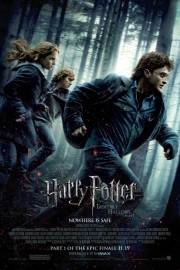Harry Potter and the Deathly Hallows, Part I
Harry Potter, both the billion-dollar film franchise and the magically-inclined youth played with uncommon maturity and heart by Daniel Radcliffe, has come a long way since the first stains of John Williams’s iconic theme first played over the Warner Bros. logo in 2001. The films that started so resolutely as family entertainments in the hands of Chris Columbus have matured, visually and emotionally, courtesy of the watchful eyes of Alfonso Cauron, Mike Newell, and David Yates. That last name is the most surprising. A British TV director, Yates made his feature debut with 2007’s “Order of the Phoenix” and has been in the director’s chair ever since.
With the first half of “Deathly Hallows” (part 2 opens in July), Yates continues the upward momentum of storytelling savvy and emotional weight we’ve felt since Cauron’s “Prisoner of Azkaban” took the franchise into darker territories. Such dramatic weight begins early here, as Harry, Ron (Rupert Grint), and Hermione (Emma Watson) prepare for the war ahead, isolating themselves from their family. Most movingly is watching Hermione cast a forgetting spell on her muggle parents, erasing her from their lives. Hogwarts is not safe since Death Eaters (including turncoat Severus Snape (Alan Rickman)) killed Professor Dumbledore (Michael Gambon) at the end of “Half-Blood Prince,” and the remaining members of the Order of the Phoenix (the group of good wizards and witches who have banded up against Lord Voldemort (Ralph Fiennes)) are trying to keep Harry and friends safe. But Harry has work to do, and with Ron and Hermione they must venture off on their own in search of the remaining Horcruxes, the objects of dark magic that each contain a piece of the Dark Lord’s soul.
Much of the film has the three kids on the run, trying to find the remaining Horcruxes, and a way to destroy them. This gives us a chance to really see how far Radcliffe, Grint and Watson have come as performers in the past decade. We’ve been given a rare opportunity to watch these three grow up onscreen, and all of them have become superb actors over the years. Radcliffe has been the franchise’s heart and soul since we first saw him in the room underneath the stairs in 2001’s “Sorcerer’s Stone,” and even then, it was impossible to see anyone else in the role. The intervening years have only deepened our connection with him; we feel the pain and loneliness he struggles with in his journey, and even though Ron and Hermione are with him, neither of them can understand what he’s going through. But Radcliffe isn’t the only one who’s matured; Grint has turned into an expert scene-stealer from film-to-film, with “Deathly Hallows Part I” allowing for some truly stellar work as Ron becomes jealous of Harry and Hermione as they set out on their trip. And Watson has grown into a wonderful actress, beautiful and brilliant like young Hermione, and capable of great feeling in intimate moments with both actors. None of these actors will be able to shake their associations with these characters, but hopefully we’ll see them all again in other, equally wonderful roles after this series is over.
Who would have suspected that David Yates, whom no one had heard of before helming “Order of the Phoenix,” would be the one to bring J.K. Rowling’s fantastic world to life in its best and most emotionally resonate films? With each film he has raised his game and brought vision and tension to the story as it has built to the end, most especially here in an evocatively-animated sequence where the truth behind what the Deathly Hallows are is revealed. In this film, his cinematographer Eduardo Serra shoots fast and loose while also creating a startling landscape for the characters to trek through. And composer Alexandre Desplat continues the legacy begun by John Williams (and continued by Patrick Doyle and Nicholas Hooper) with the creativity and feeling he’s displayed as he’s moved to the forefront of modern film composers with scores like “The Curious Case of Benjamin Button,” “The Fantastic Mr. Fox,” and even “The Twilight Saga: New Moon.” I can’t wait to see what these three bring to the end in eight months. For now, we have a heartfelt and haunting adventure that ends things with tragedy and revelation, but with our main characters more determined than ever to fight the war ahead. I for one can’t wait.










